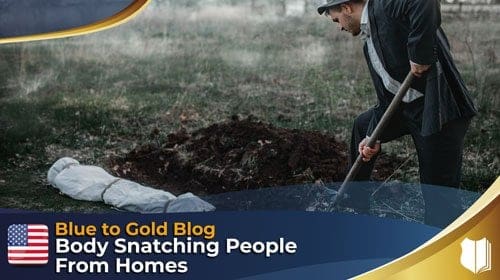

What is the Motor Vehicle Exception?
The automobile, or motor vehicle exception allows officers to search cars for evidence, contraband, and fruits or instrumentalities of crimes without a search warrant. When
or use our live chat
Customer Service


This question came from an officer yesterday in Jefferson County. It was actually kind of interesting, because what she said was, they had a call for service at a hotel, and this guy died, or let’s just say this guy was killed in a hotel room. Can we process that scene without a warrant?
I don’t know what kind of hotel this is, but I imagine it’s probably not the nicest place because this guy was in there for a while decomposing. They go in there and the officers say that the person is very decomposed.
The police and the hotel staff are not sure that this was the actual hotel occupant. And the question was, can we process that scene without a warrant?
Now, the first thing I want you to know, is the rules regarding unattended deaths. What about processing an unattended death when you do not have facts or circumstances that lead you to believe that this is a crime scene?
Well, generally speaking, you do not need a warrant for that. Police around this country are processing unattended death scenes and looking for medications without warrants, and the reason for that is because this does not offend the Fourth Amendment. These are not crime scenes.
The cop is more or less acting as a coroner, right? They’re trying to help the medical examiner fill out the forms and do their investigation. So that’s why the the Fourth Amendment is not very strict on these unattended death investigations.
However, at some point, if it turned into a crime scene, like there was some suspicion of foul play and so forth, then the regular Fourth Amendment rules would come in.
But the other reason that generally speaking, that these don’t cause problems, is because there’s somebody else living with the person. They usually call the police. And that is often considered consent to enter and to do the job needed to find out what happened here. So we can handle it that way.
The other thing is, unattended deaths are also common with people living by themselves. And let’s say there was foul play. Let’s say that there was a nurse that came by once a day and poisoned the person, because they were added to the will. They wanted to get their proceeds from the will. That person may not have a reasonable expectation of privacy to prevent the police from processing the crime scene, so stuff like that usually fixes the unattended death situations.
Let’s turn back to the story at the motel. I guess what happened was that when they turned this guy over, they saw that he had injuries to his face and blunt force trauma. Now this looks like a murder.
The other twist here is that the room was still rented for several more days. If they find him, and if the room is not rented anymore, and he’s not paid up on the room, we usually don’t have too much of an issue regarding processing the crime scene. Even if there’s somebody else involved with this room, if they’re not paid up any more, then the room returns back to the hotel. But in this case, the room is still rented.
So the problem is this. If the police are going to process the crime scene, and they find out that the killer has some reasonable expectation of privacy in that room, there is one of two possible scenarios.
Number one, let’s say that the spouse killed this person, and they were both in the room. Well, the spouse has a reasonable expectation of privacy in the room. Or, let’s say that because they don’t really know who this guy is and maybe they find out later that this is actually not the occupant, but is a victim of the person who rented the room, well, then the defendant, the renter, can challenge the police being in the room.
So at the end of the day, under this situation, the best course of events is going to be to get a search warrant once the cops realize that this is actually a crime scene, not just an unattended death. If the cops do not get a a warrant, they’re rolling the dice because that perpetrator, that defendant, could convince a court that they have a reasonable expectation of privacy. Then we have obviously got some issues with suppression.
A case that I want you to think about when you have to defend this kind of position is Mincey versus Arizona. Briefly, Mincey shot a police officer in his home. There was an undercover drug operation and he shot a police officer. Mincey was also shot and brought to the hospital. The police were in his home for four days and processing that crime scene with no warrant.
Arizona wanted a murder scene exception to the search warrant requirement, and the US Supreme Court said “NO.” So I don’t see why Mincey would not apply to the hotel room under the circumstances because again, the room is still lawfully occupied, still lawfully rented, and so forth. Maybe I’m wrong. Maybe there’s something else out there that I’m missing. But I can’t think of something that would eliminate the need for a search warrant under these facts.
I hope it helps. Thanks, guys; stay safe and keep the questions coming. I really do appreciate that.


The automobile, or motor vehicle exception allows officers to search cars for evidence, contraband, and fruits or instrumentalities of crimes without a search warrant. When


These three golden rules come from reading thousands of court cases over the last 20 years and seeing a theme regarding what the courts are


This question is: Can you look inside a woman’s purse, or a man’s backpack during a pat down? The answer is, “Maybe.” Here’s how this


Here is the question: Can an officer reach slightly into a person’s home to pull them out and arrest them? If an officer has probable
© Blue to Gold, LLC. All rights reserved